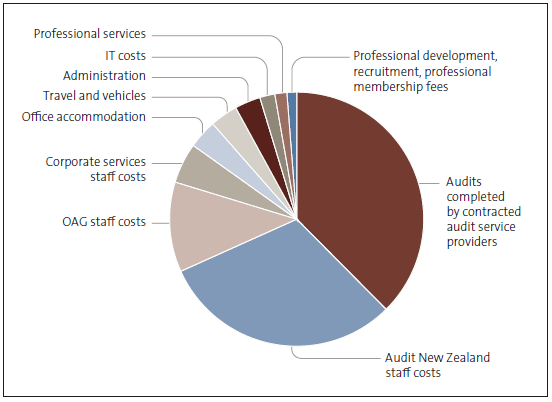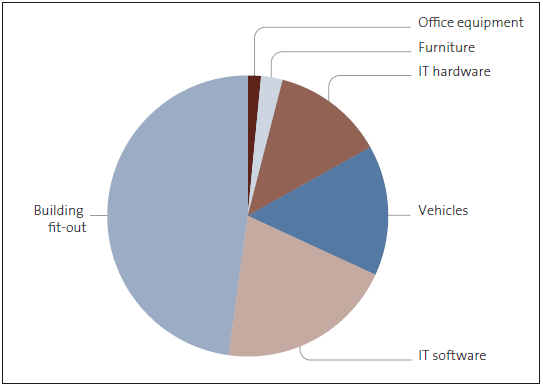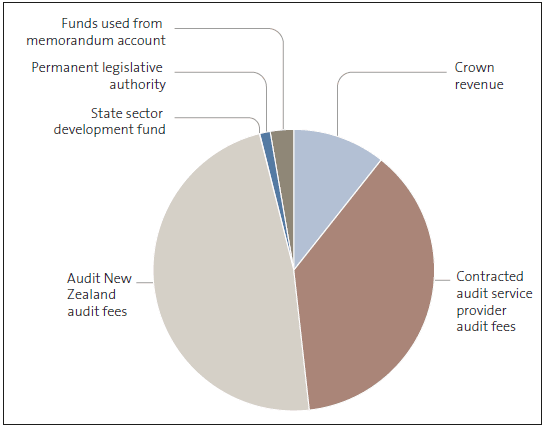Part 2: What we must manage well
Guidance from the International Integrated Reporting Council has helped us to identify six critical resources that we must manage well to be effective and create value.
The six resources are shown at the base of our performance framework on the previous page. Taking a collective view of these resources is helping us to embed integrated thinking and planning in our work. For example, we are working on an organisation development plan that is structured around the six resources. It will identify where we need to improve our systems and capability to support the delivery of our strategic objectives over the next four years.
The six resources that we must manage well are:
- Our independence and reputation;
- Our people;
- Our knowledge, information and methods;
- Our relationships;
- Our financial and physical resources; and
- Our use of natural resources.
We provide below a description of each resource, and how it creates value.
 OUR INDEPENDENCE AND REPUTATION
OUR INDEPENDENCE AND REPUTATION
Our independence and strong mandate that underpin all our work and activities.
Our independence is fundamental to everything we do and to our ability to create value over time. The whole point of our governing legislation – the Public Audit Act 2001 – is to provide Parliament with an independent view on how the public sector is operating. Our independence is given statutory recognition and protection under our legislation which is critical to exercising our ongoing role as an Officer of Parliament.
We cannot do our work without being, and being seen to be, independent. Each year, we scrutinise and apply professional judgement to financial audits of the entire public sector – about 3700 public entities – along with numerous performance audits and inquiries, and advice to parliamentary select committees about the Government's proposed spending and audit results.
Our work gives Parliament and New Zealanders an independent view about public sector performance and accountability, and enables Parliament and the New Zealand public to hold public entities to account for their performance.
Our reputation is critical to maintaining Parliament's and the public's trust and confidence in our work. As we cannot enforce our recommendations, our ability to influence is critical. We want our work to be trusted, impartial, and authoritative. To protect the integrity and reputation of the Office, Auditor-General Martin Matthews requested that Parliament review his suitability to continue as Auditor-General. This followed questions about his former role as Secretary for Transport. Martin's subsequent decision to resign helped ensure that Parliament and the public can continue to have trust and confidence in the Office's work.
We make a significant contribution to the international auditing community, particularly to Pacific audit offices. Our strong international reputation was evident when we were asked to lead the Professionalisation theme at the three-yearly meeting of Supreme Audit Institutions held in December 2016.
How we protect our independence and reputation
We identify loss of independence and reputation as two of our more significant strategic risks. We manage these risks through the processes that support our work.
We have high expectations of the independence standards that auditors who work for us must meet. These standards are described in The Auditor-General's Auditing Standards. They exceed the minimum independence standards required of auditors operating in the private sector.
All our auditors are expected to have a very good understanding of the requirements and the consequences of not meeting the expected standards. We provide advice, training, and support to help our auditors in maintaining their independence.
Our independence requirements limit the additional work that can be carried out for public entities by auditors who work for us. This eliminates the risk that other work could be seen to compromise the auditor's objectivity and diminish the standing and value of the auditor's report.
We have a range of systems and processes in place to identify and mitigate risks to our independence and reputation. Formal declarations of our independence are required for every audit or assurance engagement we carry out. We regularly report on independence situations and their resolution, and we have monitoring systems to ensure that staff with independence conflicts are not involved in those public entities. The effective relationships we have with public entities and select committees help us to manage reputational risks.
Our senior leadership team regularly discusses and reviews the effect of our work on the public sector and on our reputation. Effective working relationships with all contracted auditors who work for the Auditor-General help to ensure that any potentially difficult independence situations are communicated and resolved before they become a problem.
 OUR PEOPLE
OUR PEOPLE
Our skills, competence, and engagement that enable us to deliver high-quality work.
Our people are the most important resource we have. Their experience, knowledge, skills, and commitment are vital to our work and our ability to deliver on our strategic intentions. It is essential that we attract, develop, and retain talented staff.
As at 30 June 2017, we employed 364 people from diverse backgrounds and experiences in two business units – the Office of the Auditor-General (OAG) and Audit New Zealand – supported by a team of shared corporate services staff. We also contract auditors from about 50 private sector accounting firms to carry out annual audits on behalf of the Auditor-General.
We invest in the systems, tools, and equipment that our people need to continue to do their jobs safely and easily. We promote an organisational culture based on trust, respect, inclusiveness, and valuing each person's contribution. We consider this to be fundamental to active engagement, motivation, retaining our people, and enabling them do their best work. We also monitor remuneration changes in comparable roles, so we can be confident that we are paying our people fairly.
The principles and practice of equal employment opportunities are embedded in our human resources policies. We have continued to give effect to those principles during the year. Our website has more detailed information about our staff profile (see oag.govt.nz/our-people/staff-profile).
We are placing more emphasis on regularly monitoring our culture and the engagement of our people, and responding to their feedback to strengthen our organisational culture. This year, we identified a new employee culture and engagement tool to be implemented in 2017/18. We support our staff with flexible working arrangements, and we are actively considering how to provide more flexible ways of working. In keeping with our strategic intentions, we will prioritise developing our people's leadership skills and understanding of the Office's purpose and values.
We are recognised as an Approved Training Employer by Chartered Accountants Australia and New Zealand. We provide practical experience and support for about 32 new graduates each year as they work and study to become chartered accountants.
We encourage and support learning and development through on-the-job learning and formal training. Some of our people have been seconded internally, externally, and internationally. We also have staff who have been seconded to us from outside the Office to exchange skills and knowledge.
We continue to identify priorities for developing the skills and capability of our people to achieve our strategic objectives and strongly position ourselves to meet future challenges and changes in auditing.
 OUR KNOWLEDGE, INFORMATION, AND METHODS
OUR KNOWLEDGE, INFORMATION, AND METHODS
Our collective knowledge and expertise about the public sector.
Our mandate and independence give us access to a wealth of information, which we read, analyse, and collect as we carry out audits and our other work. This information, the knowledge we gain from it, and the methods we use to store, analyse, and share it are vital to our role and our ability to create value and insight.
We take our responsibilities for protecting and managing that information seriously. Our business processes protect access to the information we gather and help us to actively monitor and manage any risks to our independence.
Our people and their skills and experience – alongside professional standards – help to identify the right information to be gathered. Our methods help to protect the quality of what we collect, and we invest in systems that make the information available in formats that support useful analysis. The unique view we have of the entire public sector and our professional judgement enable us to draw insights that can help to improve the performance of the public sector. We also contribute internationally – our approaches are often held up as examples for others to follow, and other audit offices from around the world come to learn from us. For example, this year we shared information and advice with seven visiting delegations. We were also asked to contribute to the international peer review team tasked with review of the United States Government Accountability Office.
The quality of the relationships we have with others and the ways we communicate help us to use our knowledge to best effect – influencing others to make the improvements that our work has identified as necessary.
We are working on an organisation development plan to make sure that we continue to improve our systems and increase our organisational capability. Doing so is essential to making full use of the wealth of information we have access to. We are also exploring ways to make our information more accessible and questioning how fit-for-purpose our reporting practices will be for the next generation of New Zealanders.
We know that there are risks to our systems so we take active steps to mitigate them, including keeping our disaster recovery and business continuity plans tested and up to date. There are also risks to our capacity and methods – as well as quality assurance reviews, we are actively considering how fit-for-purpose our approaches and practices will be as we move into the next quarter of the 21st century.
 OUR RELATIONSHIPS
OUR RELATIONSHIPS
Our mutually productive and respectful relationships with all our stakeholders.
Effective working relationships with our many stakeholders are essential to our work and our ability to create value. Our most important external relationships are with Parliament, the organisations that we audit, and other audit institutions around the world (particularly in the Pacific).
As an independent Officer of Parliament, the Office cannot operate without the trust and confidence of Parliament.
Our people advise Parliamentary select committees in support of their work to hold the public sector to account. We help the committees to scrutinise the performance of public organisations on behalf of Parliament. We work hard to support Parliament while maintaining our independence from the Government and the organisations that we audit.
Our relationships with the public entities that we audit support the flow of information, intelligence, and reports that collectively improve efficiencies and, through our recommendations, the delivery of services to New Zealanders.
Good relationships are particularly important when we raise adverse audit findings or discuss complex and technical accounting issues with the public entities we are auditing. Such issues will often not be clear-cut; they can demand much discussion and usually require careful judgement. Although organisations may not always agree with our findings and recommendations, a respectful and trusting relationship helps support this part of the audit process.
Our relationships with other stakeholders also serve to strengthen public sector accountability and promote good governance. For example, we share our skills, information, and advice with other audit organisations throughout the world, particularly in the Pacific. We work with other integrity and accountability agencies – for example Transparency International New Zealand – to influence transparency and accountability in the public sector.
How we invest in maintaining effective relationships
We regularly check – formally and informally – that our stakeholders are satisfied with the relationships they have with us.
One of the challenges to maintaining effective relationships is the pace and scale of change in the public sector. High staff turnover, large-scale organisational transformation programmes, and increasingly complex institutional arrangements all require effort to ensure that our staff are engaging with the right people at the right time. We actively monitor risk across all the organisations we audit.
The challenges also provide opportunities for us to work in new ways with others. We want to make better use of our oversight of the entire public sector so that we can take more of an active "thought leadership" role and to collaborate with others to discuss ways to improve New Zealand's public management and accountability system.
Our people are at the heart of our effective relationships. We will use our organisation development plan to ensure that our people have the skills, resources, and systems necessary to make the most of the relationships that we have with our key stakeholders.
 OUR FINANCIAL AND PHYSICAL RESOURCES
OUR FINANCIAL AND PHYSICAL RESOURCES
Our use of financial and physical resources to support our work.
The financial and physical resources we use are essential to our work.
Operating costs
Most of our costs are staff-related. Other costs include office accommodation, costs of providing information technology systems, and travel for auditors to work at the premises of the organisations they are auditing.
How our operating funding was spent in 2016/17

Physical assets and software
We cannot deliver value without investing in the assets that support our work.
Building fit-out across our seven offices is our largest physical asset.
We maintain and develop our information technology hardware and software, and maintain vehicles because our staff travel for their work.
Our capital expenditure programme is funded through depreciation and amortisation of existing assets. This funding allows for replacement of our assets, but does not always allow for investing in new technology to improve our systems. We may need extra funds for this in coming years.
Breakdown of our physical and intangible assets at 30 June 2017

How we are funded
Audit New Zealand and our contracted audit service providers charge fees for the audits they carry out for the Auditor-General. A proportion of those fees are passed on to the OAG, and that money helps to cover the OAG's operating costs.
Audit New Zealand is funded by the audit fees charged to entities, which are set at a reasonable level for the audit work completed. Revenue from audit fees varies from year to year, based on the extent of audit work carried out. In some years we generate a surplus, and in other years a loss. To manage these ebbs and flows, we use a memorandum account. We put surpluses into that account so we can draw on the funds when we make a loss – this helps us to operate sustainably.
We have had the memorandum account since 2013, and 2016/17 was the first year we used funds from the memorandum account to meet our costs.
The money we use to fund performance audits, inquiries, and support to Parliament comes from Parliament (the appropriation is called Statutory Auditor Function). A separate source of funding from Parliament (the appropriation is called Audit and Assurance Services) covers part of the cost of audits of smaller entities, such as cemeteries and reserve boards. The funding from both appropriations makes up Crown revenue in the following chart.
How our operating costs were funded for 2016/17

Longer-term planning and managing risks
Every three years, we audit the long-term plans of local authorities – which means additional audit fee income every third year. This is the main cause of the surplus and deficit cycle that our memorandum account helps us to manage.
To stay on top of the fluctuations, we regularly update our five-year forecasts for expected fees, costs, and the memorandum account balance. We also keep a close eye on our financial risks.
There are risks in securing adequate audit fees to fund our operations, and risks to the affordability of having adequate numbers of competent audit staff who can complete our audits to the required standards.
We manage these risks through prudent financial management, monitoring audit fees to ensure fairness to public entities and to auditors, and ongoing work to improve the efficiency of our systems and processes.
Risks to our cash position arise from our reliance on timely invoicing and collection of audit fees, and are managed through monitoring and follow-up of audit contracts and invoicing.
 OUR USE OF NATURAL RESOURCES
OUR USE OF NATURAL RESOURCES
Our use of natural resources and managing the environmental impact of our activities.
Our environmental impact arises mainly from carrying out our business and in auditing organisations throughout New Zealand.
Our main environmental impact is from greenhouse gas emissions generated by the air travel and vehicle travel required to do our work.
Despite technology advances, most auditing work must be done on site so that our auditors have direct access to records and people. This means unavoidable travel. Our other work also requires travel – for example, our involvement with international auditing organisations.
We use energy, paper, and water in our buildings and we generate waste. We are a tenant in seven buildings. Practices for energy efficiency, paper consumption, and waste management differ depending on the age of the building, how recently it was refitted, and the practices of our landlords. We are investing in technology and practices such as enhancing our video-conferencing facilities to better manage costs and resources. We want to reduce our environmental impact, and we would like to do more.
We intend to explore other opportunities to work in a more environmentally responsible manner and be more efficient. We intend to assess our current policies and practices (including our procurement policies) and prepare a framework for measuring and reporting our effect on the environment. We will then consider options for reducing our environmental impact. Over time, we plan to consider the environmental implications of the work locations of the auditors we appoint and how we could further improve our recruitment, travel, and vehicle policies.

